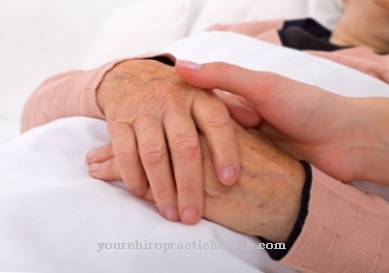The social phobia, or also Social phobia called, is an anxiety disorder. Those affected are afraid of attracting negative attention in society and of embarrassing themselves. The fear revolves around the fact that the general attention might be directed towards oneself. Around 11 to 15 percent of people will develop social phobia at some point in their life.
What is a social phobia?
.jpg)
© Piotr Marcinski - stock.adobe.com
The social phobia is defined in ICD 10 (publisher: WHO) as follows: People who suffer from social phobia are afraid of attracting attention in smaller groups and being the focus of interest. Self-esteem is low and criticism is difficult to take.
Characteristically, this fear does not occur in large crowds. It is limited to certain social situations. In some cases, fear is focused on occasions such as a public meal or a lectures. It is far more common, however, that the fear extends to many social situations.
Symptoms can include palpitations, nausea, tremors, and sweating. Since the level of suffering can even increase to panic attacks, those affected display avoidance behavior in order to avoid the side effects of social phobia.
causes
The social phobia can have different causes, mostly it is a whole network of causes. On the one hand, studies have shown that genetic predisposition can also play a role in such a disease. This is shown, for example, by twin studies.
Another reason for a social phobia can be anchored in the person's personality. People who have such difficulties tend to feel more insecure and self-doubtful, while others ignore comparable things with humor.
The low self-confidence can in turn have various causes: a loveless upbringing in which no basic trust could be developed, trauma or social deficits such as exclusion, rejection, etc. Psychotherapy can analyze the reasons for a social phobia.
Symptoms, ailments & signs
A typical symptom of a social phobia is fear of social contact. Interaction with other people is a stressful situation for those affected. A sign of a social phobia is therefore avoiding situations in which one has to come into contact with other people or have conversations.
This avoidance behavior results in corresponding complaints that can significantly reduce the quality of life. On the one hand, social contacts can hardly be avoided in normal everyday life. Professional life, family meetings or contacts in everyday situations such as visiting the doctor or shopping then become stressful situations for people affected by social phobia.
The complaints in such situations can often be of a psychosomatic nature. Palpitations, sweating, the feeling of fainting or tendencies to stutter are typical psychosomatic symptoms. Trying to avoid such situations creates new ailments. Those affected are threatened with social isolation.
The total withdrawal from everyday life then initially alleviates the fear of having to survive in social situations. Still, most people with social phobia are not consistently happy with such a limited life and wish to be able to interact normally with others. If left untreated, social phobia is often associated with depression and even suicidality.
Diagnosis & course
To a social phobia To be able to diagnose reliably, the above criteria must be met. But how does such a disease develop? Is there a typical course?
As a rule, social phobias cannot be assigned a single causal reason. They tend to be creeping and develop slowly over the years. If the disease is not treated appropriately, there is a risk of becoming chronic. Often addictions and / or depression join in, with those affected trying to help themselves with alcohol, medication or drugs.
One then speaks of comorbidity. It can often be seen that sick people withdraw further and further and become lonely. However, if this disorder is treated in good time, the prognosis for curing a social phobia is favorable.
Complications
Social phobia is a disease that should not be underestimated. Those affected avoid dealing with other people. They withdraw, increasingly isolate themselves from the social "outside world" and often develop depression. For many patients, even going to the doctor is only possible after several attempts. The horror begins on the street.
There, phobia patients can still avoid other people, but escaping is impossible on the bus, tram or subway. The fear solidifies. Affected try to cover up the condition. You resort to drugs such as sedatives (benzodiazepines). In order to survive the trip to the doctor, a short-term use as an aid is perfectly acceptable.
However, it is strictly not to be used over a longer period of time, as this leads to dependence and further problems. Some social phobics develop different strategies. You are consuming alcoholic beverages. This can quickly lead to alcohol addiction.
Avoiding certain situations leads to further restrictions in the everyday life of people with social phobia. For example, this can make it more difficult to choose a suitable profession. If this is finally found, it can still be canceled. Even staying in the classroom during theoretical lessons can trigger a threatening condition for the phobic. Not infrequently this ends in panic attacks.
Some of those affected make the step to become a skilled worker, while others remain unskilled for life and can only temporarily stay afloat with auxiliary work. Without medical treatment, a social phobia can worsen to such an extent that those affected are no longer able to make social contacts. Sometimes this can encourage suicidal behavior.
When should you go to the doctor?
As a pathological anxiety disorder, social phobia is always a reason to consult a doctor. In such situations, psychotherapists are most likely to help. The problem, however, is that the transition between a high level of shyness or insecurity and real fear is not always clear.
People who find it very difficult to socialize and who are characterized by disappointment and fear of failure are not necessarily affected by a social phobia. The social phobia is therefore considered to be pathological if the fear leads to avoidance behavior. This means that the sufferer really experiences limitations due to the fear. These restrictions are the reason to seek help. The limitations can be social isolation or the fear of interaction in general.
If it is unclear to what extent personal or psychological circumstances lead to these restrictions, a professional conversation partner should be sought. This does not necessarily have to be a doctor. A psychologist can also help, as can a well-trained coach. It is crucial that in a social life that is experienced as severely restricted there is a willingness to examine and change this. If, on the other hand, the social phobia has advanced so far that that is no longer possible, the environment is responsible.
Treatment & Therapy
But how can one social phobia be treated successfully? It has now been recognized that a combination of psychotherapy and drug treatment is the most promising. There are various antidepressants available, such as sertraline or mirtazapine, which have an anxiolytic effect because they act on certain areas of the brain in which fear arises.
The right drug setting is the prerequisite for psychotherapy to be effective at all. Psychotherapeutically, cognitive behavioral therapy is usually used so that those affected learn to build a positive self-image and better deal with defeat. In this context, the aim is to make patients more independent from the opinions of others.
In addition, various relaxation techniques such as progressive muscle relaxation or autogenic training are practiced to reduce stress. With a good mastery of these relaxation techniques, crises can ideally be averted. In the short term, a social phobia can also be treated with benzodiazepines. Diazepam or alprazolam, for example, are suitable for this.
Due to the addictive potential of these tranquilizers, however, they should be used as sparingly as necessary and as briefly as possible. So there are a few approaches that can be used to treat social phobias.
You can find your medication here
➔ Medicines to calm down and strengthen nervesprevention
Since it is not known exactly what social phobias Ultimately triggers, it is difficult to take preventive measures. It was found, however, that a derogatory and negative attitude on the part of parents or peers in childhood increases the risk. You should therefore take this into account in your own parenting style. In addition, if you first suspect you should seek treatment, because then the prognosis for curing a social phobia is best.
A social phobia requires psychotherapeutic aftercare, as it accompanies the person affected for a lifetime. If the patient was previously treated as an inpatient during a hospital stay, follow-up care prepares them for returning to everyday life outside of psychiatry.
Aftercare
The scope of aftercare depends on the individual condition of the patient. Regardless, fear is a primary symptom of a phobia. Fear throws those affected out of balance. This is why a possible deterioration can never be completely ruled out, even with a successfully treated person who has been stabilized emotionally.
In behavioral aftercare, the patient deepens his knowledge of how he can better integrate his phobia into everyday processes. At the same time, the psychologist explains which behavior is helpful in acute fearful situations. The person affected should be encouraged to visit the therapist outside of regular office hours, especially in the event of such events.
The address of the therapist has the function of a 'protective island'. Should the patient no longer be able to pursue his previous job due to the phobia, the psychologist will also look after him in this case. The risk that the inability to work will develop into depression in addition to the phobia is very high. This unfavorable course of the disease is counteracted with aftercare.
You can do that yourself
A confrontation with the fear-inducing situations, as used in behavior therapy, can also be carried out by those affected themselves. Self-help books and training notebooks can help. Although self-help books are not enough for every social phobia to completely overcome social anxiety, they can lead to significant improvement in some people.
People with a social phobia can also find support on the Internet. Various online groups in the form of forums, apps and social media groups can help those affected to not feel alone with their fears. If the online self-help group works together to reduce avoidance behavior and reduce other symptoms, it can also bring about concrete progress. However, most forums and online groups focus more on mutual relief than on a (self-) therapeutic approach.
Another possibility for self-help is offered by groups that meet in real life. However, many social phobics get in the way of their fears, because they don't dare to meet a group of strangers in unfamiliar surroundings.
Mindfulness can help relieve symptoms of stress and also improve specific symptoms of social phobia. Above all, mindfulness is a complement to other methods.

.jpg)


.jpg)

.jpg)










.jpg)







.jpg)


